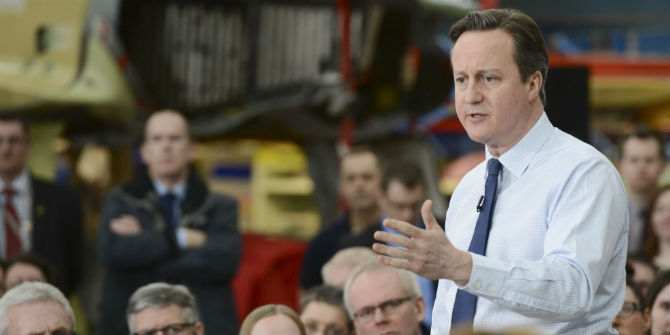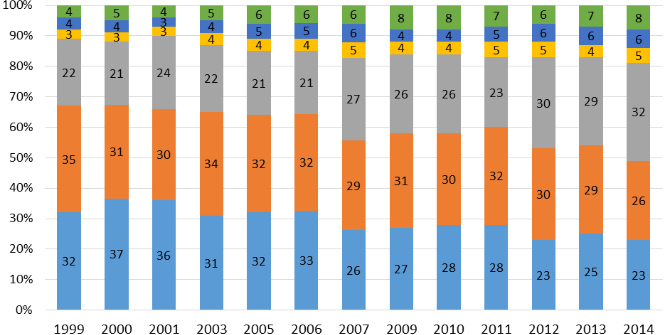 Conspiracy theories are a feature of political discourse across Europe, but are some types of voters more likely to believe in conspiracy theories than others? Jan-Willem van Prooijen presents findings from a study of belief in conspiracy theories among individuals in the Netherlands and the United States. He writes that those on the extreme left and right of the political spectrum, together with those who are more likely to have faith in there being simple solutions to complex political problems, are substantially more likely to also believe in conspiracy theories.
Conspiracy theories are a feature of political discourse across Europe, but are some types of voters more likely to believe in conspiracy theories than others? Jan-Willem van Prooijen presents findings from a study of belief in conspiracy theories among individuals in the Netherlands and the United States. He writes that those on the extreme left and right of the political spectrum, together with those who are more likely to have faith in there being simple solutions to complex political problems, are substantially more likely to also believe in conspiracy theories.
Whenever threatening, high profile events take place, conspiracy theories offering alternative explanations to the official narrative tend to emerge. One does not need to look far on social media to find sweeping statements about recent events, such as ‘Israel’s national intelligence agency Mossad committed the Charlie Hebdo attacks’, ‘Islamic State beheadings were staged by Hollywood producers’, or ‘the economic crisis in the EU was deliberately caused by the International Monetary Fund’.
Far-fetched as these conspiracy theories might be, it would be a mistake to portray conspiracy theorists as simply mentally ill: indeed some conspiracy theories – including theories that the CIA was behind the John F. Kennedy assassination, or that 9-11 was an inside job – are endorsed by a surprisingly large number of citizens. Moreover, conspiracy beliefs can have harmful consequences: people who believe that climate change is a hoax will be less motivated to reduce their carbon footprints; while people who believe that the pharmaceutical industry tries to harm instead of help the public through vaccines are less likely to get their child vaccinated. There is therefore good reason for the social sciences to conduct serious research on the psychology behind belief in conspiracy theories.
The link between political ideologies and conspiracy theories
Conspiracy theories often assume that politicians, or governmental institutions, are playing a role in a scheme or plot designed to harm or deceive the public. It therefore stands to reason that political ideology matters for the conspiracy theories that people consider to be plausible. As might be expected, the political left tends to be suspicious of the political right, and the political right tends to be suspicious of the political left. But the best predictor of belief in a given conspiracy theory is belief in another conspiracy theory: put simply, people often exhibit a ‘conspiratorial mindset’ that seems to transcend traditional left-right distinctions.

How does ideology relate to the general susceptibility of individuals to believe in conspiracy theories? In a recent study with André Krouwel and Thomas Pollet, I illustrate that it is not necessarily the content, but rather the strength of one’s political ideology that predicts how likely people are to accept a range of conspiracy theories. That is, the political extremes – at both the left and the right side of the political spectrum – are most likely to have the required mindset that makes them prone to perceive conspiracies as a primary cause of important global events.
A core feature of political extremists is that they tend to make clear-cut assumptions about the world, by rigidly classifying people, institutions, or events as positive or negative, competent or incompetent, evil or benevolent, and so on. Such black-and-white thinking is reflected in a belief that, with the right policies, societal problems can be solved rather easily – this contrasts with political moderates, who are more likely to appreciate the complexities of many of the problems that the world faces.
This style of thinking – referred to as ‘belief in simple political solutions’ – feeds into one of the main functions of conspiracy theories: to provide comprehensive explanations for distressing events that are hard to make sense of otherwise. Conspiracy theories enable believers to resolve any ambiguity, and to find answers for any open question, when confronted with distressing events – by assigning blame to a set of powerful actors that they deem to be untrustworthy. Indeed, all conspiracy theories – even those which at first glance appear articulate or well-constructed – essentially depart from a simple assumption: that the official explanation must be dishonest. Belief in conspiracy theories and political extremism are associated with a similar, highly structured, style of perceiving and interpreting societal events.
Conspiracy beliefs among the political extremes
We conducted four studies – one in the United States, and three in the Netherlands – to test the relationship between political extremism and belief in conspiracy theories. In these studies, research participants (over 2,700 in total) were asked to indicate where they placed themselves on a political scale ranging from (extreme) left to (extreme) right. In addition, we asked participants to indicate how plausible they considered common conspiracy beliefs about a diverse range of topics, such as the financial crisis, climate change, the war in Iraq, suspicions that politicians are connected to organised crime, and other examples.
From their responses, we calculated how prone participants generally were to believe in conspiracy theories. Results indicated that people on both the extreme-left and extreme-right believe in conspiracy theories more strongly when compared to people in the political centre. Furthermore, we asked to what extent participants believe that societal problems could, in principle, be easily solved. Mirroring the findings on conspiracy beliefs, both extremes believed more strongly in simple political solutions than moderates did. Finally, our statistical analyses revealed that this faith in simple political solutions accounted for the increased belief in conspiracy theories among political extremists. Evidently, political extremism and conspiracy beliefs are rooted in the same rigid style of thinking.
Our findings establish a link between political extremism and a general susceptibility to conspiracy beliefs. Although the extreme left may sometimes endorse different conspiracy theories (e.g. about capitalism) than the extreme right (e.g. about science or immigration), both extremes share a conspiratorial mindset, as reflected in a deep-rooted distrust of societal leaders, institutions, and other groups, allied with a corresponding tendency to explain unexpected, important events through conspiracy theories. This insight may be relevant for the question of why those on the political extremes have displayed substantial intolerance of other-minded groups, often with devastating consequences, on so many occasions throughout history.
Note: This article was originally published on our sister site, the LSE’s EUROPP blog, and gives the views of the author, and not the position of the British Politics and Policy blog, nor of the London School of Economics. Please read our comments policy before posting.
 Jan-Willem van Prooijen is an Associate Professor in the department of Social and Organizational Psychology at VU University Amsterdam, and a Senior Researcher at the Netherlands Institute for the Study of Crime and Law Enforcement (NSCR).
Jan-Willem van Prooijen is an Associate Professor in the department of Social and Organizational Psychology at VU University Amsterdam, and a Senior Researcher at the Netherlands Institute for the Study of Crime and Law Enforcement (NSCR).








I am comfortable with the results of this study since it accords with my suspicions about the political extremes. It would be interesting to see how consistent this would be in a variety of poorer countries or countries with a more monolithic political culture.
About 40% of NewYorkers do not believe the official 9/11 story. https://en.m.wikipedia.org/wiki/Opinion_polls_about_9/11_conspiracy_theories#Zogby_International
There are few good points in this article. But I do not support a generalized view where majority voter segments belonging on either extremes in the political spectrum that they are more likely engage in conspiracy beliefs. The suggestions would have been a lot more clearer if the study included countries that do not have above average/elevated ‘liberal practices’ in the democratic space but has voting structure and most public discourses are prohibited by the state (i.e. HK, Egypt, Russia & CIS, middle-eastern countries..etc) rather than just limiting them to US & Netherlands which I think the study already has an error on anchoring bias.
Also, there is a majority view that when defining “conspiracy theory”, as the article would suggest, it immediately describes events as “positive or negative, competent or incompetent, evil or benevolent… [and] dishonest”. Which I think for me is a grey area on how to view/observe “events” (there are social sciences disciplines out there that normally goes beyond the scope of conventional thinking like in political sciences in international relations, geopolitics, international political economy, geoeconomics, war & conflict studies..etc.). Since there are no concrete definition neither methodologies to observe an event, it is rather difficult to distinguish whether observations conducted are a credible observation or just simply a conspiracy view. Another example would be in the realm of behavioral sciences, say for instance about states actors practices in “public relations”, some argue its an unethical & exploitative practices, where in fact it is a common and normal practices in most businesses, media, sales & marketing and electoral campaigns. So, how do we then view which is a conspiracy and which one is not? How about rigging practices in financial markets? From an rational perspective, they would argue that rigging practices is impossible while the irrational camp says prices are far from equilibrium.
I hope that social science(s) particularly in policy disciplines would really deal and put a lot of effort, innovating thinking, rediscovering new approaches, establishing credible methodologies to look at events in multitude of perspectives where it could really consider a perspective that from an informal view/layman it would look like it is a conspiracy theory, where in fact it is not.
There may be other disciplines out there that already took a leap on this field, like systems thinking, complexity, and some other interdisciplinary studies. But I really hope that social science(s) will revolutionize this approach. It is an exciting endeavor, I think.
I disagree. Billions upon billions of people on neither the extreme left or right believe that 19 largely Saudi hijackers conspired to cause 9/11.
This appears to disprove the whole thrust of your article.
Suggest you read up on ‘conspiracy theory’. This helps to avoid conflating it with ‘conspiracy’..